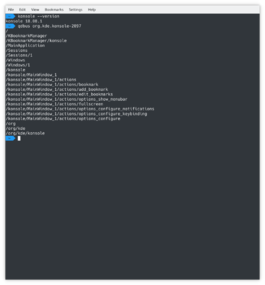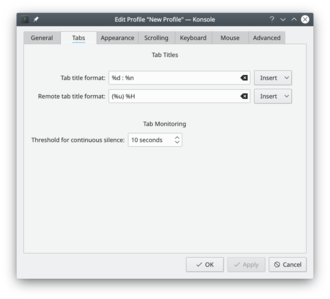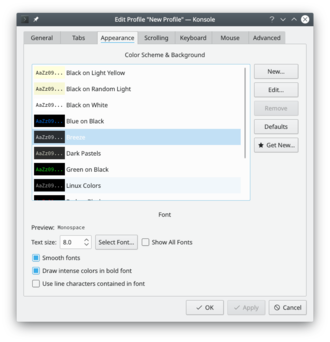Konsole
 |
Konsole es el emulador de terminal de la plataforma KDE |
Descripción general de características
- Emulador de terminal X
- Hace que usar la línea de órdenes sea más sencillo
- Uso de diferentes perfiles para diferentes tareas
- Configura el límite para scrollback y guarda el contenido en un archivo
- Clic en los enlaces para abrirlos en el navegador por defecto del usuario
- Abre el directorio actual en el navegador de archivos del usuario
- Tiene un fondo transparente disponible si los efectos de escritorio están activados
Konsole es un emulador de terminal X para la plataforma KDE, que permite al usuario utilizar de forma conveniente la línea de comandos. Además de proporcionar una forma de usar una potente shell, Konsole también ofrece características que hacen más fácil o mas agradable el trabajo con la línea de órdenes, como gestión de perfiles, scrollback, y temas de colores, incluyendo efectos de transparencia.
Konsole también proporciona una terminal integrable con KPart que es usada por aplicaciones como Yakuake, Dolphin, y Kate, dando a los usuarios una interfaz consistente y familiar para trabajar con la línea de órdenes.
Tutoriales y consejos
Idioma
With Konsole you can change the language to plain English (to see bugs info for example) by command:
export LANG=C
Shortcuts
- Switch tab: Shift + Left, Shift + Right (not like X-Chat, Firefox, Quanta, Kdevelop).
- New tab: Shift + Ctrl + T.
Label your Tabs

If you regularly use a lot of tabs, you'll sometimes find it convenient to label them. Just double-click on the tab and you'll get a re-name dialogue.
Profile Management
- To add a new profile go to
- On the tab, enter the new profile name and change the icon if desired.
- If this is to be a root konsole, enter the command :
/bin/su -

sudo suor just prepend all your commands that requires superuser privileges with sudo.
- Font size can also be changed on the tab.

- On the screen you can add or remove a star, which controls whether that profile is to be offered on the File menu.
Related Sites
Keywords
Terminal emulator, command line, CLI, shell
